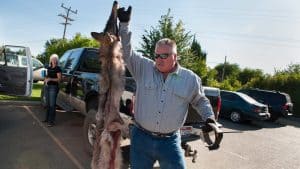In the only case where the Forest Service is a party …
- Settlement agreement in Crow Creek Pipeline case
On August 10, a federal district court approved an agreement between the U.S. Forest Service and two environmental groups that filed a lawsuit to stop the 50-mile Crow Creek Pipeline Project that partially crosses the Caribou-Targhee National Forest. The Forest Service agreed to first conduct additional environmental studies. Here is plaintiffs’ take: “the government canceled the project without even waiting for a final court order.”
Other cases of possible interest …
Court decision in Fallon Paiute-Shoshone Tribe v. U. S. Department of the Interior (9th Cir.)
On July 25, the 9th Circuit Court of Appeals refused to bar construction of a Nevada geothermal plant that opponents say threatens to destroy a sacred site and drive the rare Dixie Valley toad to extinction. However, following the emergency listing of the toad under ESA, the developer has agreed to delay construction while consultation occurs between the BLM and Fish and Wildlife Service. The district court case was discussed here, and remains pending.
New case: WildEarth Guardians v. Colorado Department of Public Health and Environment
On July 26, WildEarth Guardians, Center for Biological Diversity, Sierra Club, High Country Conservation Advocates, and Wilderness Workshop sued in a state court to compel Colorado state agencies to comply with their mandatory duty to timely grant or deny the air pollution operating permit application submitted for the West Elk Coal Mine located on the Gunnison National Forest, as required by the Colorado Air Pollution Prevention and Control Act. Under this state law, major polluters are required to obtain and comply with air pollution operating permits. The state was required to either approve or deny a permit for the mine by September 2021. The press release includes a link to the complaint. We last discussed the West Elk Mine here.
- Mt. Rushmore fireworks
On July 27, the 8th Circuit Court of Appeals dismissed an appeal by the Governor of South Dakota and 16 other intervenor states of the decision by the National Park Service to deny a permit for fireworks at Mt. Rushmore National Park in 2021 (which was upheld by the district court). The case was now considered moot, but the court also upheld the requirement to obtain a permit, stating, “Nobody has a right to shoot off fireworks on someone else’s land.” There is a link to the opinion in this entertaining take by the Dakota Free Press. The original case was summarized here.
Court decision in Cascadia Wildlands v. Scott Timber Co. (D. Oregon).
On July 29, the district court enjoined three timber companies from logging on the Benson Ridge Tract, a private parcel of land (that used to be part of the Elliott State Forest) in the Coastal Range of Oregon, because the logging project would “take” marbled murrelets, a threatened species, in violation of section 9 of the ESA. The court specifically upheld the determination that the site is occupied by marbled murrelets and that a 49-acre clearcut would result in harm.
Settlement agreement in Western Watersheds Project v. Feldhausen (D. Ariz.)
On August 1, The Bureau of Land Management and Fish and Wildlife Service agreed to reevaluate the impacts of the resource management plan’s livestock grazing decisions on plants and animals inside Arizona’s San Pedro Riparian National Conservation Area. This will include preparing a biological assessment and biological opinion analyzing the impacts of the RMP proposal for additional grazing on the Huachuca water umbel, southwestern willow flycatcher, desert pupfish, Gila topminnow, northern Mexican gartersnake, yellow-billed cuckoo and Arizona eryngo. The article has a link to the settlement agreement. The complaint was summarized here.
Court decision in Western Organization of Resource Councils v. U. S. Bureau of Land Management (D. Mont.)
On August 3, the district court ordered the BLM to consider a no-leasing alternative and to disclose to the public the environmental and human health harms from the combustion of federal coal for the Miles City (MT) and Buffalo (WY) resource management plans in the Powder River Basin. The news release contains a link to the opinion.
- Gray wolves

New case: Center for Biological Diversity v. USDI (D. Mont.)
On August 9, the CBD along with the Sierra Club, the Humane Society of the United States and the Humane Society Legislative Fund challenged the U.S. Fish and Wildlife Service’s failure to make a mandatory 1-year finding on whether the gray wolf warrants (re)designation as “threatened” or “endangered” under the ESA. They claim laws passed by Idaho and Montana this past year have allowed for new and aggressive wolf-killing measures that are putting too much pressure on the species that was delisted in Idaho, Montana and Wyoming in 2011 and 2012. The article has a link to the complaint. (I like the expression on the woman’s face.)
New case: Center for Biological Diversity v. Washington Department of Fish and Wildlife (Washington state court)
Also, on August 5, five conservation groups filed a lawsuit asking a Washington State court to enforce a governor’s order to enact wolf management rules.
On August 8, a federal district court in Seattle held that NOAA Fisheries had authorized Southeast Alaska’s chinook troll fishery at levels that the federal agency admits are pushing federally protected southern resident killer whales and wild chinook salmon closer to extinction. The Court found that NOAA violated the ESA by improperly relying on uncertain mitigation measures in the form of hatchery production that “lack specific and binding plans, lack specific deadlines or otherwise-enforceable obligations, and are not subject to agency control or otherwise reasonably certain to occur.” The Court further found NOAA violated the ESA by relying on the supposed benefits to SRKWs from increasing hatchery production, without fully evaluating the harm those same hatchery increases will cause to native Chinook salmon populations in Puget Sound, the Columbia River, the Snake River, and the Willamette River. NOAA recognizes hatcheries and associated impacts as one of the top four factors contributing to the decline of wild salmon, along with overharvest, habitat loss, and hydroelectric dams. Reduced reliance on hatcheries could lead to greater emphasis on habitat conditions, including waters on public lands.
Settlement agreement in Center for Biological Diversity v. U. S. Bureau of Land Management (C.D. Cal.)
On August 12, a legal agreement was reached to secure the permanent closure and restoration of 11 long-dormant oil wells along the Santa Barbara-San Luis Obispo County line inside the Carrizo Plain National Monument. A proposed new permit for additional operations will not be granted by the BLM. The news release has a link to the agreement.
